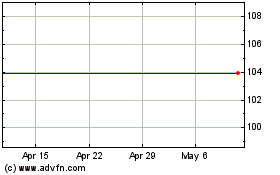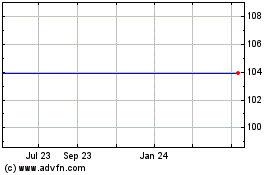Business Move Toward Accepting Tablets, But Hurdles Remain
October 25 2010 - 1:51PM
Dow Jones News
Tablets are moving into business--whether corporations are ready
or not.
Consumers so far have led the surging use of tablets, and they
increasingly want to use the personal devices for work. In
addition, hardware makers are planning a new wave of tablets
designed for business purposes.
However, the growth of tablets is creating problems for
businesses, which have to secure the devices, determine how much
access to give their employees and bolster their networks without
facing sharply higher IT support costs.
"A lot of companies used to say 'No, no, no, not approved, not
supported, not authorized, not in my environment,'" said Jere
Brown, chief executive of the Americas at Dimension Data PLC, which
helps companies build and manage their networks. "But it's so
pervasive now, you can't say no."
Demand for mobile devices like tablets has soared since Apple
Inc. (AAPL) released its iPad in April. Last week, Apple said more
than 65% of the Fortune 100 companies have deployed or are piloting
the iPad.
Meanwhile, other companies are launching tablets tailored for
business use. Hewlett-Packard Co. (HPQ) last week unveiled its
Slate 500 tablet, and products from Cisco Systems Inc. (CSCO) and
Research In Motion Ltd. (RIMM) are expected early next year. Also,
Samsung Electronics Co. Ltd. (SSNHY, 005930.SE) and Avaya Inc. soon
will release tablets.
Gartner projected that world-wide media tablet sales will soar
to 54.8 million units in 2011 from an expected 19.5 million this
year.
But the prevalence of tablets in the workplace presents some
problems. Perhaps most importantly, companies have to determine
what level of network access to give their employees--everything,
just their email or something in between.
"Applications allowing people to connect to their desktop [from
a tablet] is a security person's worst nightmare," said Ahmed
Datoo, vice president of marketing for Zenprise Inc., a company
that provides software to help companies manage and apply
security.
Many companies have emerged to try to solve these problems,
ranging from mobile-device managers like Zenprise and BoxTone Inc.
to virtualization-software companies like VMware Inc. (VMW) and
Citrix Systems Inc. (CTXS), which has a virtual-desktop app for the
iPad known as the Receiver.
Desktop virtualization allows users to access their data without
saving any of the information on the devices, preventing the
information from being compromised if the device is lost.
"No data resides on the iPad itself," said Mick Hollison, Citrix
vice president of marketing. "Unless someone can figure out the
user's [security passwords], they can't access it."
And the companies making tablets geared toward businesses are
hoping their products will address some of the issues.
Research in Motion, which plans to release its PlayBook next
year, is counting on users' familiarity with the BlackBerry
platform and security to drive demand.
"Companies don't want to put in new security," said Jeff
McDowell, RIM senior vice president of platform and business
product marketing. "They want to use the security they trust in the
BlackBerry today, and they want to use that in a tablet
environment."
And Cisco, which will release its Cius tablet in the first
quarter, said its product is designed to address businesses' needs
by including security for hardware, software and whatever's loaded
to the device and giving IT departments more control over the
devices.
"There's always a give and take between the user and
administrator on how much control each has," said Tom Pourro, Cisco
director of IP communications. "Cius gives the ability to control
everything or control nothing," as well as varying control levels
in between.
Meanwhile, Carol Hess-Nickels, H-P director of marketing for
worldwide business notebooks, said any security available for
notebook PCs is available for the Slate 500, including VPN and
encryption. And Ray Vinson, senior manager of product planning at
Samsung Telecommunications America, said Samsung provides a base
level of security around exchange policies and can help users
implement stronger security if needed.
With the increase in tablets and new technology to help secure
them, businesses will have to find a way to navigate them and
decide what works best for them.
"The rules are changing as we go forward," said Giovanni Forte,
president and chief executive of Trellia Networks Inc., a Canadian
company that helps companies manage their mobile devices. "Nobody
has 100% of the answer...for this blending of consumerism and
business."
-By Shara Tibken, Dow Jones Newswires; 212-416-2189;
shara.tibken@dowjones.com
Citrix Systems (NASDAQ:CTXS)
Historical Stock Chart
From Jun 2024 to Jul 2024

Citrix Systems (NASDAQ:CTXS)
Historical Stock Chart
From Jul 2023 to Jul 2024
